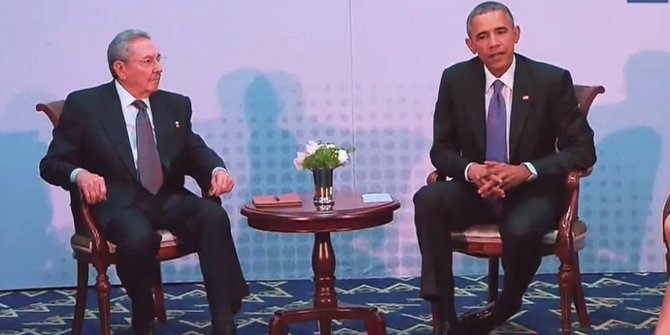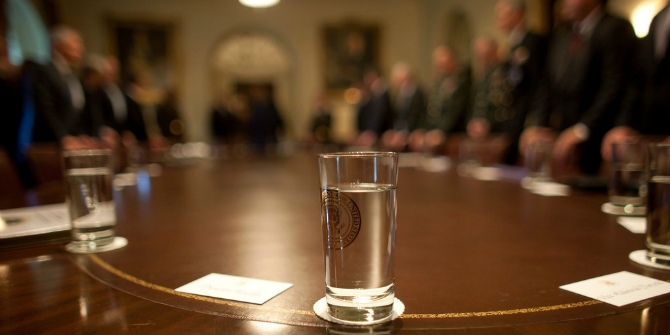 Last week a preliminary agreement was reached between Iran and the United Nations’ P5+1 negotiating group over that country’s nuclear program. Harry Blaney III writes that despite criticisms from Congressional Republicans and Israel’s Prime Minister, Benjamin Netanyahu, the 10-year deal is a key signal that both sides on the negotiations wish to move towards a measure of reconciliation. The task now facing the Obama administration is to make clear to Israel that this agreement is in its interest and to emphasize its importance to the American people.
Last week a preliminary agreement was reached between Iran and the United Nations’ P5+1 negotiating group over that country’s nuclear program. Harry Blaney III writes that despite criticisms from Congressional Republicans and Israel’s Prime Minister, Benjamin Netanyahu, the 10-year deal is a key signal that both sides on the negotiations wish to move towards a measure of reconciliation. The task now facing the Obama administration is to make clear to Israel that this agreement is in its interest and to emphasize its importance to the American people.
The notion that Iran is undeterrable–it’s simply not the case. And for us to say, ‘Let’s try’–understanding that we’re preserving all our options, that were not naive–but if in fact we can resolve these issues diplomatically, we are more likely to be safe, more likely to be more secure, in a better position to protect our allies, and who knows? Iran may change. If it doesn’t, our deterrence capabilities, our military superiority stays in place…We’re not relinquishing our capacity to defend ourselves or our allies. In that situation, why wouldn’t we test it?”
– President Obama in an interview with New York Time’s op-ed columnist Thomas L. Friedman on the risks of the Iran Nuclear Deal, published April 6, 2015
In many ways the “framework” agreement between Iran and the P5+1 nations, announced at the end of last week, achieves the key necessary elements for assurance against any Iranian unknown nuclear “breakout.” It provides the basis for future initiatives that might, with great focus and a large amount of wisdom and patience by all sides, move some of the destructive dynamics in the region towards some measure of reconciliation and what we used to call ‘detente.” Yet, from the cries from its critics at home, the hysterical opposition of Israel’s Prime Minister, Benjamin Netanyahu and his right-wing supporters, and some in the Sunni Gulf States, there is still a lot of hefty lifting to do to sell this effort by President Obama and Secretary John Kerry at home and abroad.
The road towards the final text and agreement may still produce some bumps, but the key signal is that both sides want and need an agreement that puts to rest the dangers of both the Iranian weapons program and the likely dangers of a non-agreement for a long period. This agreement also can set the stage, with some luck, for other measures of dialogue and possible understandings that might serve American interests in achieving a more general security landscape for all nations in the region.
While right now this seems a very difficult task given the current convulsions, for that very reason it is one that needs to be undertaken and likely may take years or even a decade to come fully to fruition.
The domestic opposition comes from the same expected right-wing neo-cons and Republicans hawks that seem to think that anything short of bloody war is unacceptable. Would they put American troops on the ground in Iran? Would they have us bomb Iran to smithereens on the behalf of Israel’s own misguided right wing war-hawks or to help facilitate a mad joint attack? They have not said about “then what” because there is no good answer or outcome of that option. They talk in vague generalities and provide no clear security and mutual accommodation path towards stable peace in the Middle East, but indeed seem to want added conflict and chaos.

President Obama already has indicated he will “consult” with Congress. But sadly, it is likely that the diehards on the right of the GOP and even some Democrats will be seen as skeptical to appease their paymasters and crazies in deadly opposition to Obama no matter what is in the agreement. The key now is to stop any effort to pass a new sanctions bill on Iran or one that would require Congressional agreement to the final accord. There is a long history of such international agreements by both Republican and Democrat presidents. If this had been Ronald Reagan, the Republicans would be praising the hell out of this accord.
Obama holds hopefully the high card here as, in the end, he can veto any bill that tries to destroy this agreement. The President will need to work hard to get enough support in Congress to prevent the dismantling of the agreement; it will be a very hard hill to climb to get them to agree to revoking sanctions. However, there are other avenues to this end via Presidential actions, our cooperative allies, and the UN Security Council.
The problem with getting understanding, let alone agreement with Netanyahu is that the whole justification of his regime is to maintain a constant state of aggression and antipathy against the Palestinians and Iran. While there is some understanding for this given the past, it is a counterproductive stance if one wants long-term peace and security for all in the region. It is doubtful that the Israeli Prime Minister will relent and may likely employ his supporters in the U.S. to fight this accord no matter the circumstances.
Yet, many supporters of Israel know that an agreement that ensures a de-nuclearized Iran for a long period of time, the full engagement of the U.S. in the region, and the creation of a true peace deal, is in the real interests of Israel and the required two-state agreement. The former security officials of Israel know that it is unfortunate that Netanyahu only cares about his own political future, rather than his people and keeping Israel’s state security free from continued threats and the escalation of military capabilities. While some kind of reconciliation with the U.S. would be hoped for, it is for him to make the first move given his continued intransigency and duplicitous behavior. Yet, in some way the administration needs badly to make clear to Israel’s citizens that this agreement is in their interest, that we care about and support their security, and want and will still seek a peaceful region. For that, we are already rethinking our stance in the region and paths towards some kind of firm of peace settlement.
The other task is to get the support of the American people and our allies as to the benefits of this agreement. Most of the public has little knowledge of the issues, the trade-offs, and the importance of this agreement. This needs to change. Administration leaders need to get on the airwaves to argue for this accord. Obama can expect widespread conservative and right-wing media opposition from the likes of Fox News, the Wall Street Journal, the Washington Post and the talking nuts on radio. This will be hard to overcome unless the administration, experts in the area, and Democratic politicians do a full court press on the merits of this accord with the media. On their side is the polls show most Americans do not want to make war with Iran.
On the issue of dealing with the largely Sunni Gulf States and in particular Saudi Arabia, the president has invited the leaders of these states this Spring to Camp David. Already Saudi King Salman has taken a less confrontational position and has said to Obama that he hoped it would strengthen “stability and security in the region.” The discussion will include not only the new agreement, but likely an attempt to get some measure of wide cooperation on a strategy that will also address other security concerns in the region, as well as to see if a path is possible for some measure of cooperation and meeting of the minds between Sunni and Shia nations. This is but only one step towards a more stable region, but it is one of the key building blocks in a very complex region filled with conflict and mutual animosity that needs to be addressed.
In the end, we and our allies will need to talk to both leaders of Sunni and Shia nations as there are already signs of common interest in putting down ISIS’s universal butchery towards both Sunni and Shia as well as other minorities and in bringing stability and economic prosperity to the entire region. This is a job for more than one administration and America had better be wise in its future choice of its own leaders.
A version of this post originally appeared at the Rethinking National Security blog.
Please read our comments policy before commenting.
Note: This article gives the views of the author, and not the position of USApp– American Politics and Policy, nor of the London School of Economics.
Shortened URL for this post: http://bit.ly/1HM1Toi
______________________
About the author
 Harry Blaney – Center for International Policy
Harry Blaney – Center for International Policy
Harry Blaney is a Senior Fellow at the Center for International Policy. He brings over thirty years of experience in international affairs to CIP and has held senior positions in the federal government, policy research, and non-profit organizations. His experience includes the White House, State Department, foreign affairs think tanks, and U.S. diplomatic posts abroad. His main focus has been on national security, including non-proliferation arms control, US-Europe relations, US-Russia, and global issues including energy, climate change, conflict zones, NATO, EU, and macro-strategic issues.






